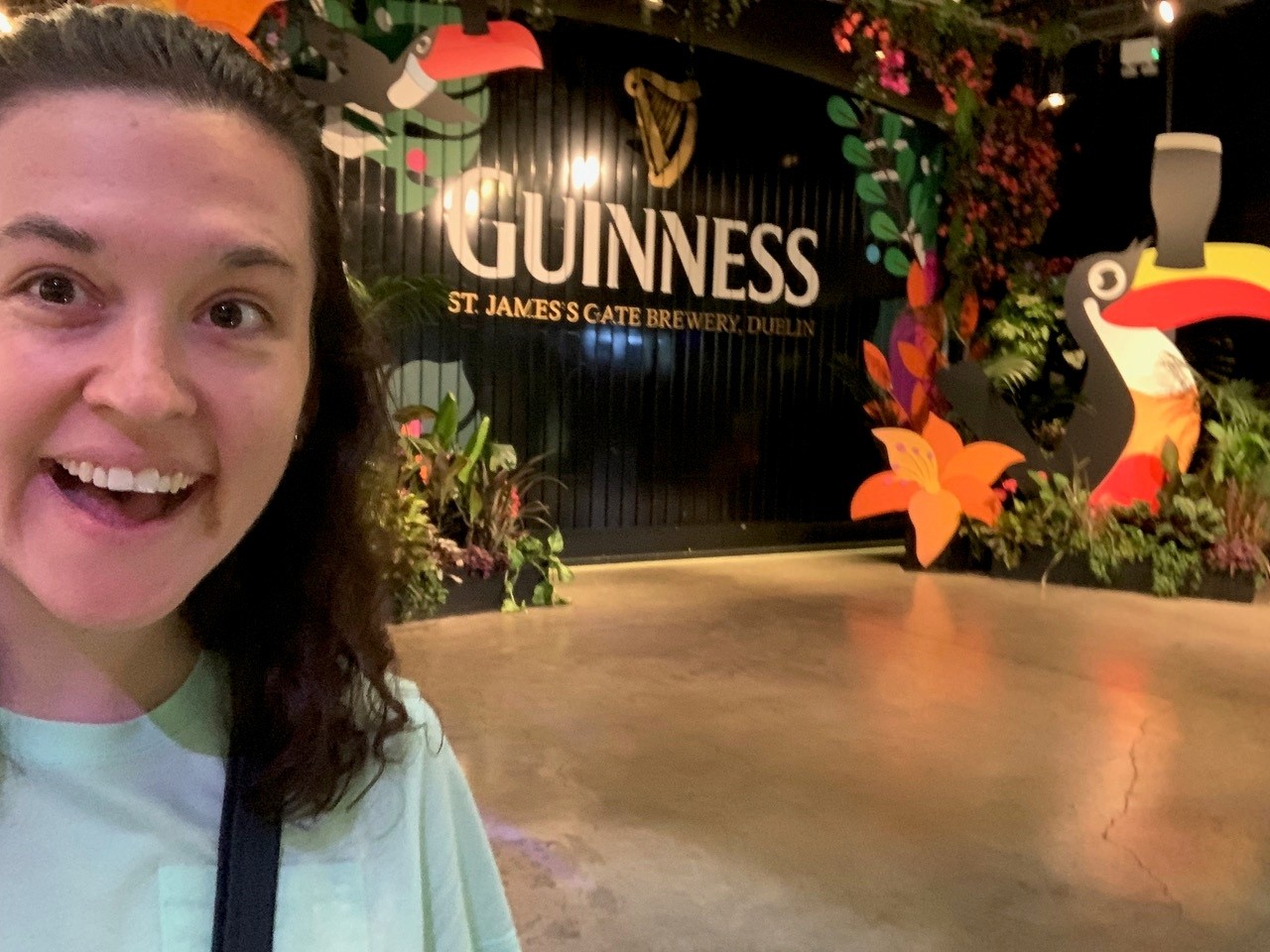St. Patrick’s Day (March 17) is an annual holiday commemorating St. Patrick, the patron saint of Ireland. Yes, that one - he’s the guy who, as legend has it, drove all the snakes off the island and out of the country. While it has religious origins, St. Patrick’s Day has now evolved into a global celebration of all things Irish and Ireland. Festivities often include traditional music, dance, sports, language, food, and beverages, too – in sum, Irish culture, which has been passed down for generations.

Flux Flux Communications Committee Member Emily Harriot at the Guiness Storehouse
What does this “intergenerational cultural transmission” mean for children and their development? It likely isn’t surprising that research suggests that culture likely influences children’s development. Indeed, the “intergenerational transmission of cultural socialization” has been found to relate to several outcome measures of healthy child development. “Cultural socialization” involves exposing children to and discussing their heritage, customs, and history. This can look like taking children to Irish dance class, baking Irish soda bread, attending a traditional Irish music session, sharing Irish folk stories, or cheering on a Gaelic football team (up the tribesmen!). “Intergenerational transmission” just means that older generations pass this knowledge down to younger generations - perhaps grandma tells the story of Finn MacCool to her grandchildren, or three (maybe even four!?) generations cozy up by the fireplace at the local pub to listen to live fiddle and bodhran tunes.
How and why do we think we know that this cultural socialization impacts child development? While correlation does not imply causation, correlational studies are informative. One particular study conducted in a sample of Mexican-origin grandmothers, mothers, and children found that greater grandmother-mother and then mother-child cultural socialization was linked to greater receptive language abilities and interactive play with peers in children by age 5 years (Williams et al., 2021). Receptive language is one’s ability to understand language. Better receptive language is associated with better child outcomes. Interactive play with peers is a good thing, and supports arguably every aspect of child development - linguistic, social, emotional, etc. Another study of similar design found that African American children whose parents engaged in cultural socialization with them demonstrated fewer internalizing (anxiety, depression) and externalizing (hyperactivity, impulsivity) behaviors (Caughy et al., 2002). Fewer behaviors of these varieties are associated with better child outcomes. Intergenerational transmission of cultural socialization likely supports healthy child development.
The mechanism (or mechanisms!) by which cultural socialization benefits children’s development are unclear. On one hand, it could be that discussing culture with children gives parents more and different content to talk to their children about, thus increasing the number of unique words the children hear, increasing children’s vocabulary and ultimately improving their language abilities (Caughy et al., 2002). It could also be that discussing culture gives children knowledge of and consequently more confidence in their cultural identities, which supports their development mentally and emotionally (Serrano-Villar & Calzada, 2016). Or it could be something else. Honestly, like most conclusions made from research, it’s probably a little bit of all of the above!

Riverdance at the Gaiety Theatre
While (to the author’s knowledge) this phenomenon of cultural socialization has not been explicitly studied in the context of Ireland/Irish culture specifically, findings from studies of families of other cultures can likely be generalized (at least to some extent). That being said, this feels like a great opportunity to
highlight the large, longitudinal “Growing Up in Ireland” study, which, when complete, might help illuminate the impact of intergenerational transmission of cultural socialization in the context of Ireland. This study has been collecting data since 1998, and some preliminary results have already been published.
What can we take away from all of this? Discussing, engaging in, and practicing your culture with your children is likely beneficial for their development in a variety of different ways.
And at long last, why does the Flux Society’s latest monthly blog post center around Irish culture? First of all, timing - it is St. Patrick’s Day month, after all! More relevantly, while unfortunately a bit late for St. Patrick’s Day celebrations, the Flux Society is so excited to visit Ireland this coming September for its annual Congress! The Congress will take place in Dublin, and when not discussing developmental cognitive neuroscience (and implications for practice and policy) at the Dublin Royal Convention Center, Congress attendees will be able to engage in Ireland’s rich culture themselves.
From watching Riverdance at the Gaiety Theatre, to enjoying traditional tunes (and maybe even a pint!) at the Cobblestone Pub, to wandering through St. Stephen’s Green, to appreciating the view from the top of the Guinness Storehouse, there are so many things to do and see.

St. Stephen's Green
Sláinte!
References
Caughy, M. O., O'Campo, P. J., Randolph, S. M., & Nickerson, K. (2002). The influence of racial socialization practices on the cognitive and behavioral competence of African American preschoolers. Child development, 73(5), 1611–1625. https://doi.org/10.1111/1467-8624.00493
Serrano-Villar, M., & Calzada, E. J. (2016). Ethnic identity: Evidence of protective effects for young, Latino children. Journal of applied developmental psychology, 42, 21–30. https://doi.org/10.1016/j.appdev.2015.11.002
Williams, C. D., Bravo, D. Y., Umaña-Taylor, A. J., Updegraff, K. A., Jahromi, L. B., Martinez-Fuentes, S., & Elias, M. J. (2020). Intergenerational transmission of cultural socialization and effects on young children's developmental competencies among Mexican-origin families. Developmental psychology, 56(2), 199–207. https://doi.org/10.1037/dev0000859
